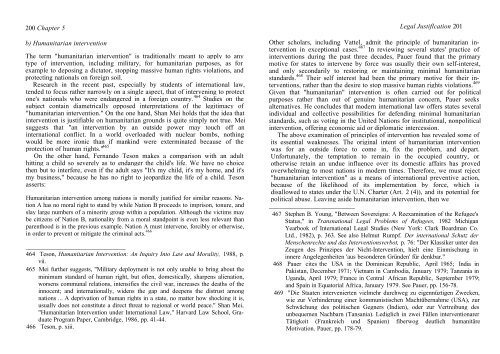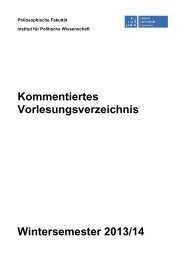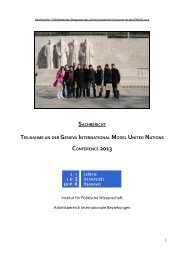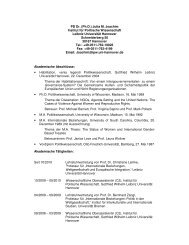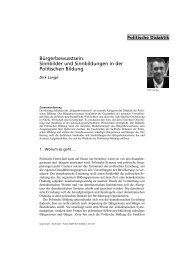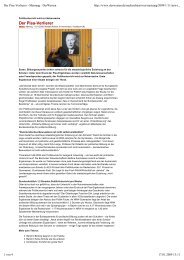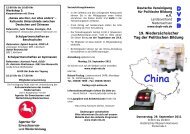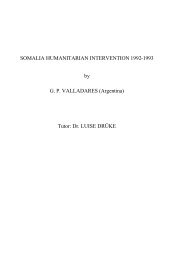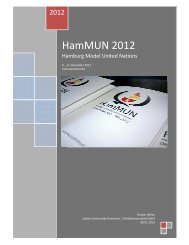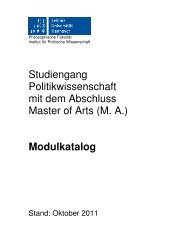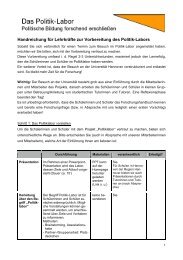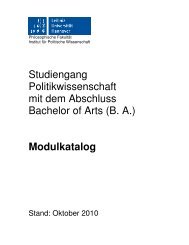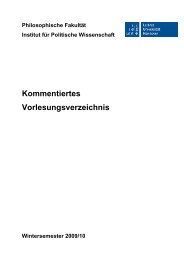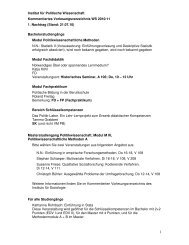Preventive Action for Refugee Producing Situations
Preventive Action for Refugee Producing Situations
Preventive Action for Refugee Producing Situations
You also want an ePaper? Increase the reach of your titles
YUMPU automatically turns print PDFs into web optimized ePapers that Google loves.
200 Chapter 5<br />
b) Humanitarian intervention<br />
The term "humanitarian intervention" is traditionally meant to apply to any<br />
type of intervention, including military, <strong>for</strong> humanitarian purposes, as <strong>for</strong><br />
example to deposing a dictator, stopping massive human rights violations, and<br />
protecting nationals on <strong>for</strong>eign soil.<br />
Research in the recent past, especially by students of international law,<br />
tended to focus rather narrowly on a single aspect, that of intervening to protect<br />
one's nationals who were endangered in a <strong>for</strong>eign country. 464 Studies on the<br />
subject contain diametrically opposed interpretations of the legitimacy of<br />
"humanitarian intervention." On the one hand, Shan Mei holds that the idea that<br />
intervention is justifiable on humanitarian grounds is quite simply not true. Mei<br />
suggests that "an intervention by an outside power may touch off an<br />
international conflict. In a world overloaded with nuclear bombs, nothing<br />
would be more ironic than if mankind were exterminated because of the<br />
protection of human rights." 465<br />
On the other hand, Fernando Teson makes a comparison with an adult<br />
hitting a child so severely as to endanger the child's life. We have no choice<br />
then but to interfere, even if the adult says "It's my child, it's my home, and it's<br />
my business," because he has no right to jeopardize the life of a child. Teson<br />
asserts:<br />
Humanitarian intervention among nations is morally justified <strong>for</strong> similar reasons. Nation<br />
A has no moral right to stand by while Nation B proceeds to imprison, tonure, and<br />
slay large numbers of a minority group within a population. Although the victims may<br />
be citizens of Nation B, nationality from a moral standpoint is even less relevant than<br />
parenthood is in the previous example. Nation A must intervene, <strong>for</strong>cibly or otherwise,<br />
in order to prevent or mitigate the criminal acts. 466<br />
________________________________<br />
464 Teson, Humanitarian Intervention: An Inquiry Into Law and Morality, 1988, p.<br />
vii.<br />
465 Mei further suggests, "Military deployment is not only unable to bring about the<br />
minimum standard of human right, but often, domestically, sharpens alienation,<br />
worsens communal relations, intensifies the civil war, increases the deaths of the<br />
innocent; and internationally, widens the gap and deepens the distrust among<br />
nations ... A deprivation of human rights in a state, no matter how shocking it is,<br />
usually does not constitute a direct threat to regional or world peace." Shan Mei,<br />
"Humanitarian Intervention under International Law," Harvard Law School, Graduate<br />
Program Paper, Cambridge, 1986, pp. 41-44.<br />
466 Teson, p. xiii.<br />
Legal Justiflcation 201<br />
Other scholars, including Vattel, admit the principle of humanitarian intervention<br />
in exceptional cases. 467 In reviewing several states' practice of<br />
interventions during the past three decades, Pauer found that the primary<br />
motive <strong>for</strong> states to intervene by <strong>for</strong>ce was usually their own self-interest,<br />
and only secondarily to restoring or maintaining minimal humanitarian<br />
standards. 468 Their self interest had been the primary motive <strong>for</strong> their interventions,<br />
rather than the desire to stop massive human rights violations. 469<br />
Given that "humanitarian" intervention is often carried out <strong>for</strong> political<br />
purposes rather than out of genuine humanitarian concern, Pauer seeks<br />
alternatives. He concludes that modern international law offers states several<br />
individual and collective possibilities <strong>for</strong> defending minimal humanitarian<br />
standards, such as voting in the United Nations <strong>for</strong> institutional, nonpolitical<br />
intervention, offering economic aid or diplomatic intercession.<br />
The above examination of principles of intervention has revealed some of<br />
its essential weaknesses. The original intent of humanitarian intervention<br />
was <strong>for</strong> an outside <strong>for</strong>ce to come in, fix the problem, and depart.<br />
Un<strong>for</strong>tunately, the temptation to remain in the occupied country, or<br />
otherwise retain an undue influence over its domestic affairs has proved<br />
overwhelming to most nations in modern times. There<strong>for</strong>e, we must reject<br />
"humanitarian intervention" as a means of international preventive action,<br />
because of the likelihood of its implementation by <strong>for</strong>ce, which is<br />
disallowed to states under the U.N. Charter (Art. 2 (4)), and its potential <strong>for</strong><br />
political abuse. Leaving aside humanitarian intervention, then we<br />
_________________________<br />
467 Stephen B. Young, "Between Sovereigns: A Reexamination of the <strong>Refugee</strong>'s<br />
Status," in Transnational Legal Problems of <strong>Refugee</strong>s, 1982 Michigan<br />
Yearbook of International Legal Studies (New York: Clark Boardman Co.<br />
Ltd., 1982), p. 363. See also Helmut Rumpf. Der international Schutz der<br />
Menschenrechte und das Interventionsverbot, p. 76: "Der Klassiker unter den<br />
Zeugen des Prinzipes der Nicht-Intervention, hielt eine Einmischung in<br />
innere Angelegenheiten 'aus besonderen Gründen' für denkbar."<br />
468 Pauer cites the USA in the Dominican Republic, April 1965; India in<br />
Pakistan, December 1971; Vietnam in Cambodia, January 1979; Tanzania in<br />
Uganda, April 1979; France in Central African Republic, September 1979;<br />
and Spain in Equatorial Africa, January 1979. See Pauer, pp. 156-78.<br />
469 "Die Staaten intervenierten vielmehr durchweg zu eigennüztigen Zwecken,<br />
wie zur Verhinderung einer kommunistischen Machtübernahme (USA), zur<br />
Schwächung des politischen Gegners (Indien), oder zur Vertreibung des<br />
unbequemen Nachbarn (Tansania). Lediglich in zwei Fällen interventionarer<br />
Tätigkeit (Frankreich und Spanien) fiberwog deutlich humanitäre<br />
Motivation. Pauer, pp. 178-79.


